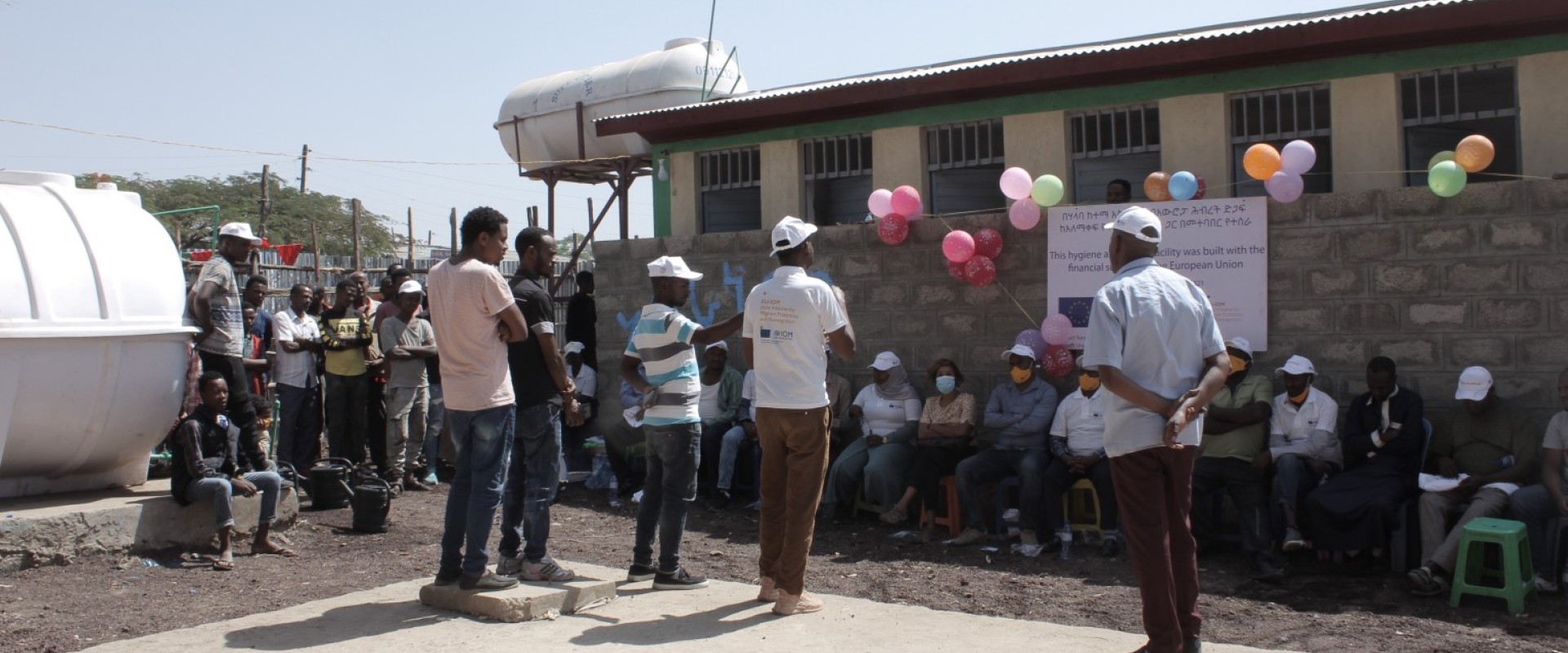A Different Kind of Business, and Migrant Returnees are Part of it
Rehoboth Sekel found a job working as a house maid in Beirut, but was forced to leave when the economic situation in Lebanon deteriorated.
“I found many challenges, and after two years I was not able to support my family or myself, so I returned home,” she said.
Rehoboth registered with the local government as a migrant returnee in her hometown, Halaba Kulito, in Ethiopia’s Southern Nations, Nationalities, and Peoples' Region (SNNPR).
In no time she came into contact with the EU-IOM Joint Initiative for Migrant Protection and Reintegration in the Horn of Africa (the EU-IOM Joint Initiative).
Rehoboth is now among 20 returnees and other youth in Halaba Kulito who are taking part in an unusual project allowing them to earn an income from a washroom block in the city centre.
Halaba Kulito was identified as an area with a high rate of irregular migration, and the project is part of efforts by the EU-IOM Joint Initiative to address the needs of the community.
The washroom block – consisting of a shower and toilets - is the first business of its kind in Halaba Kulito. It is situated in a market area with high traffic volumes.
“I believe this is a once-in-a-lifetime opportunity. My teammates and I are treating it as such. We are combining all our knowledge and experience, as well as the trainings and help we have received from IOM and the government to make sure this business is profitable,” Rehoboth said.
Going by the name Halaba Sanitation Facility, the block is one of over 25 community projects implemented by the EU-IOM Joint Initiative in Ethiopia.
Eight of the beneficiaries in the facility are returnees, and the remaining 12 were selected by the local government among youth most likely to see irregular migration as the answer to the dearth of work opportunities in the city. Dereje Tentesa is one such youth.
Although he has never left the country, Dereje had been struggling to find a job. “There aren’t many work opportunities for young people here. When I found out about the sanitation facility project, I knew I had to get involved,” he said.
Dereje is the chairperson for the association that brings together project beneficiaries. The name they gave to their collective is Ijarname Youth Association. Ijarname means “to build” or “to prosper” – which leaves no doubt as to the group’s ambitions.
Customers pay ETB 15 (about USD 0.29) to have a shower and ETB 3 to use the toilet. However, the members also have plans to start related businesses in the area, such as serving coffee and other refreshments.
Halaba Sanitation Facility is operated by a revolving management structure overseen by the local Bureau of Labour and Social Affairs. The current beneficiaries will run it and share the profits for three years before making way for a new group of beneficiaries.
“The community projects are valuable assets for the areas that they serve. In the case of the Halaba sanitation project, it serves the direct beneficiaries who operate and profit from it but it also adds value to the city of Halaba Kulito by being its first public sanitation facility,” commented Kidist Mulugeta, the Strategic Partnership Officer for the EU-IOM Joint Initiative in Ethiopia.
The project was officially inaugurated on 8 March, 2022.
About the EU-IOM Joint Initiative
Launched in December 2016 and funded by the European Union (EU) Emergency Trust Fund for Africa, the programme brings together 26 African countries of the Sahel and Lake Chad region, the Horn of Africa, and North Africa, the EU, and IOM around the goal of ensuring migration is safer, more informed and better governed for both migrants and their communities.
For More information, please contact Adam Sahilu, email: asahilu@iom.int or Wilson Johwa, email: wjohwa@iom.int
